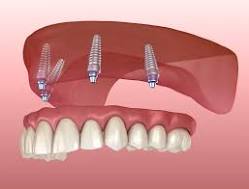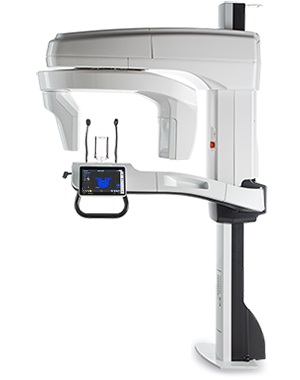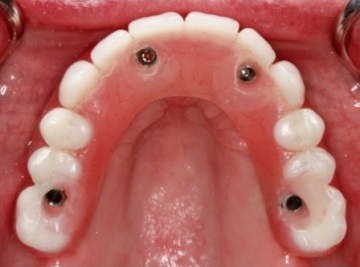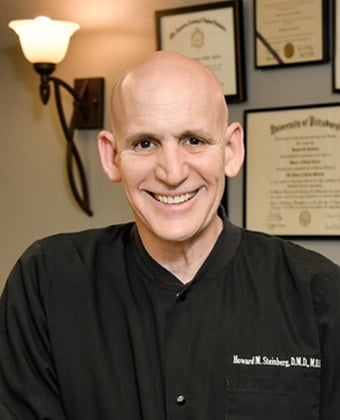Tucson Implant-Supported Dentures
If you are missing all your teeth, implant-supported dentures can restore your smile, confidence, and ability to chew. As a prosthodontist, Dr. Steinberg specializes in major restorative projects such as rehabilitating smiles using implants.
Removable vs. Implant-Supported Dentures
 Removable dentures are a basic option for people who have lost all their teeth. Dr. Steinberg can give you a quality set of dentures that fit your mouth precisely. Removable dentures will restore your appearance, but even the best will only restore about half of your chewing ability. Then, over the years, your jawbone will shrink making it difficult to even retain a denture without the use of messy pastes.
Removable dentures are a basic option for people who have lost all their teeth. Dr. Steinberg can give you a quality set of dentures that fit your mouth precisely. Removable dentures will restore your appearance, but even the best will only restore about half of your chewing ability. Then, over the years, your jawbone will shrink making it difficult to even retain a denture without the use of messy pastes.
Implant-supported dentures are a big step up in quality. Here are some of their advantages:
- Implants prevent the shrinking of your jawbone. When you lose your teeth, your body senses that your jawbone is no longer needed and begins to resorb it to use the minerals elsewhere. Implants signal to your bone that it is still needed and prevent that resorption.
- Implant support prevents your denture from sliding around. It secures your denture, restoring your bite strength so you can eat anything you want.
- Food tastes better with implant dentures because removable dentures cover your upper palate, which is where some of your taste buds are located.
- Since they slide around, removable dentures can rub your gum tissue, creating painful sores. Implant-based dentures rest on the implants integrated into your jawbone, so there’s no stress on your gums.
- You prevent the possible embarrassment of your dentures coming loose in public.
The Implant-Supported Denture Procedure
One advantage to having Dr. Steinberg do your implant-supported denture is that he is fully trained in both the surgical and restorative phases of your treatment. As a prosthodontist, he has advanced training qualifying him as a specialist in these procedures.

He will begin with careful diagnosis. One of his tools is a cone-beam computed tomography scanner (CBCT scanner). This creates a three-dimensional view of your jawbone and helps him know where to place the implants to avoid nerves and blood vessels or placing them so that they perforate the bone into soft tissue spaces.
If you desire, he can provide conscious sedation for the surgery, which will make it so that you have little to no recollection of the procedure.
The implants then need time to fuse with the jawbone, a process called osseointegration. This ordinarily takes several months. While osseointegration takes place, you will likely be provided a provisional denture.
When you are given the final denture, it will snap securely onto the implants. You will find that it will seem almost like you have your natural teeth back. And the dentures will look so natural that others will not know that they aren’t your own teeth.
Other Implant Options
You can also have a fixed implant denture that has the teeth firmly attached to the implants. There are several variations of this option:
- If you have enough remaining bone, you
could have an implant bridge. The teeth will be attached directly to the implants and will sit on top of the gum.
- A hybrid implant denture adds pink acrylic to the teeth, to replicate the gum tissue. A photograph of a hybrid is on the right. It is attached with screws and can’t be removed at home.
- An All-on-4 implant is a variation of the hybrid denture that has the implants placed at angles to increase retention. It is especially useful if there isn’t enough bone to support a traditional hybrid without bone grafting. You can read more about that on our All-on-4 dental implants page. This is sometimes called Teeth-in-a-Day, since it can give you teeth fixed to the implants on the day of the surgery.
An implant-supported overdenture is usually secured by four implants, but even using two implants gives a great improvement over a removable denture. A fixed implant denture can be secured by four, six, or eight implants. More implants mean a stronger restoration and more protection for your jawbone. If necessary, Dr. Steinberg can place bone grafts to fortify your jawbone.
Dr. Steinberg enjoys challenging cases and is an expert in specialized implantology methods, including periosteal implants, sinus lifts, and ramus frames. He understands the worries of anxious dental patients and offers either oral or IV sedation during surgery. A nurse anesthetist administer the IV sedation and monitor your vitals during the procedure.
If you’d like to schedule a complimentary consultation with Dr. Steinberg, please call us at (520)-886-3030. You can also fill out this form, and we will contact you.


 could have an implant bridge. The teeth will be attached directly to the implants and will sit on top of the gum.
could have an implant bridge. The teeth will be attached directly to the implants and will sit on top of the gum.


